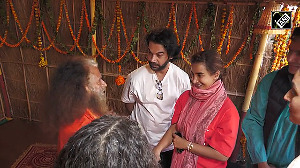On the eve of the first high-level talks between India and the new Obama Administration in Washington, with the arrival of Foreign Secretary Shiv Shankar Menon, who will meet with Secretary of State Hillary Clinton and other senior US officials later today (Monday), outgoing Ambassador Ronen Sen has dismissed concerns over the momentum of the relationship under the new dispensation in DC.
There have been growing concerns both in New Delhi and among the business and industry lobby in the US over the Obama Administration's leaning toward protectionism in the wake of the economic meltdown and massive job losses as well as what is expected to be a strong stand on nonproliferation and a drive to seek ratification of the Comprehensive Test Ban Treaty, which could put India and the US on a possible collision course.
However, Sen, pooh-poohed these concerns during a farewell reception accorded him by a coalition of Indian-American associations of the Washington DC metropolitan area, saying that US-India relations that were virtually galloping during the last few years of the Bush Administration, would endure because the foundations were now rock solid and highly unlikely to return to the days when New Delhi and Washington were estranged democracies.
"I have had the privilege of meeting President Obama -- when he was Senator -- a number of times," Sen said, and declared, "My honest belief -- not my belief, but my very firm conviction -- is that this relationship since it's based on shared values, which President Obama spoke about in his Republic Day address (message to congratulate India on its Republican Day), since it's based on shared concerns, since it's based on the common interests of the two countries, this relationship stands on the basis of its own merits."
Besides, Sen argued that there is a "bipartisan consensus" in the US government and this, "we shouldn't constantly be repeatedly questioning this fundamental fact of life."
He asserted that he was convinced that there would be "continuity" in the relations, and at the sustained pace that had developed post-May 1998 Pokhran tests with the visit of President Clinton to India in March 2000, which marked the transformation in US-India ties.
Sen said "this latest phase in the improvement of our relationship began -- it actually began in a sense -- in 1998 when the nuclear tests which we conducted, shortly after that Kargil, was a defining moment, which led to a historic visit by President Clinton to India."
"This was the beginning, it gave a huge impetus to this relationship and that baton was picked up by President Bush and this relationship was taken to unprecedented heights."
Sen said that "what we have done in the past few years is what we actually telescoped into decades and into years, but this would have not been possible if it was not again, due to bipartisan support," in the US Congress.
Thus, he reiterated that "I don't think we should constantly be questioning ourselves. We should have a little bit more confidence in our own self."
Menon, accompanied by Sen, will meet Clinton at 3 pm at the State Department, and the Secretary of State will be joined by her deputy Jim Steinberg, Special Representative to Afghanistan and Pakistan, and the Foreign Secretary's diplomatic vis-à-vis, Under Secretary of State for Political Affairs, William Burns.
There is expected to be a broad discussion of bilateral and regional issues with the situation and Afghanistan and Pakistan permeating the talks, and also the situation in Sri Lanka where tens of thousands of Tamil refugees are trapped in the LTTE strongholds and both India and the US have called for their evacuation on humanitarian grounds.
A commitment to the bilateral relationship and reiteration of joint partnerships to fight terrorism, and a discussion on how to move the US-India civilian nuclear deal forward and toward implementation is also on the cards.
Menon is also slated to meet with senior officials at the Pentagon and also meet up at the White House with National Security Adviser Jim Jones and Bruce Riedel who is co-chairing the strategic policy review on Afghanistan and Pakistan.
He is also scheduled to travel up on Capitol Hill for meetings with members of the Senate Foreign Relations Committee, including chairman Senator John Kerry, Massachusetts Democrat, and the ranking Republican, Senator Richard Lugar of Indiana, although these meetings are still to be nailed down.






 © 2025
© 2025